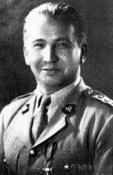 Log in om de coördinaten te kunnen zien.
Log in om de coördinaten te kunnen zien.
 173x Gevonden
173x Gevonden  4x Niet gevonden
4x Niet gevonden  8 Opmerkingen
8 Opmerkingen  13 Volgers
13 Volgers  Beoordeeld als: goed
Beoordeeld als: goed
 1 x Aanbevolen
1 x Aanbevolen
 Cache attributen
Cache attributen




At the time of 2nd World War in 1940 at this house Leopold Okulicki was hiding. One day there was Gestapo's hunting for polish underground soldiers. When lieutenant Czesław Pikuliński "White" was orientate in it, he has warned Okulicki to escape and jumped through the window on the 2nd floor. He has died as a hero, but his commander has survived and later - become a commandant of Polish Underground Army.
In 1939 Leopold Okulicki "Bear" was made commander of one of the departments of the Polish Commander-in-Chief's Headquarters. After Edward Rydz-Śmigły evacuated his staff from Warsaw, Okulicki remained in the Polish capital and served in various posts during the Siege of Warsaw. After the capitulation of the Polish troops defending the capital, Okulicki evaded capture by the Germans and joined Służba Zwycięstwu Polski, one of the first underground resistance organizations formed in Nazi- and Soviet-occupied Poland. In January 1940 he moved to Łódź, where he assumed the post of commander of the local area of that organization. After a brief stint at Headquarters, he was transferred to Soviet-occupied Lwów and became head of that area.
Arrested by the NKVD in January 1941, he was imprisoned and tortured in various Soviet prisons. Released after the Sikorski-Mayski Agreement of 1941, he joined the Polish Army re-created in the USSR, where he assumed the post of the chief of staff. After a brief period as the commanding officer of the Polish 7th Infantry Division he was moved to London for training in the Cichociemni training camp and then transported to occupied Poland. In July 1944, during Operation Tempest, he became the commander of the 2nd Echelon of the Home Army. General Bór-Komorowski, predicting his arrest by the Soviets after the Warsaw Uprising named him his deputy and successor. Okulicki fought in the Uprising, among other posts as the chief of staff of the Home Army. After the capitulation of the Uprising, he managed to evade being captured by the Germans and moved to Kraków, from where he started to reorganize the Home Army. On 3 October 1944 he became the commander of the entire organization. After the Soviet take-over of Poland, on 19 January 1945, he ordered the disbandment of the Home Army, fearing that future existence of an allied force in Poland would only lead to more people being murdered or arrested by the Soviets. Following an NKVD provocation, he was arrested and imprisoned in Moscow. Sentenced to 10 years in the staged Trial of the Sixteen, he was murdered on 24 December 1946 in Butyrka prison.
Gloria victis
The cache is a micro-tube and is hidden in the fence.
 Extra hints
Extra hints
 Afbeeldingen
Afbeeldingen
 Logs:
Logs:
 173x
173x
 4x
4x
 8x
8x




 Beschrijving
Beschrijving



